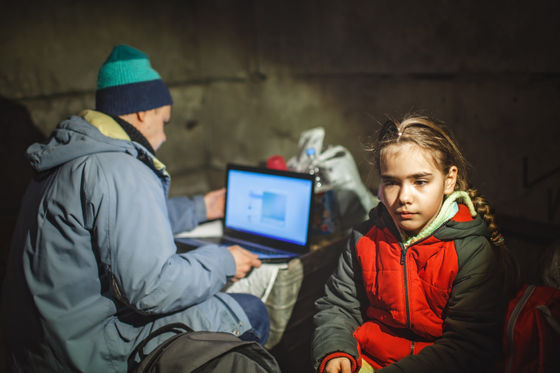What will happen to the Internet if a world war occurs?

More than half a century has passed since
Fragility, Digitally: The internet during world war | The OECD Forum Network
https://www.oecd-forum.org/posts/fragility-digitally-the-internet-during-world-war
“The possibility of an Internet collapse scenario, where credit cards suddenly become unusable, people can no longer read news on the Internet, panic occurs, hoarding and ATMs are destroyed, is more likely than is commonly thought,” he said. Nick Merrill, a researcher at the University of California, Berkeley, speaks. Mr. Merrill is also responsible for the 'Internet Atlas Project', a project that studies the long-term risks facing the Internet.

In analyzing the danger of the Internet collapsing due to a world war, Mr. Merrill first considered '
Since the Internet term 'domain' also means 'territory,' such discussions generally keep in mind that the Internet is the battlefield of cyber warfare. But the Internet itself is not immune to war, as it is both a medium and an object of conflict. In this regard, Mr. Merrill expresses, 'The Internet is not only a domain, but also a subject of international competition and cooperation.'
So, what are the risks that the Internet faces when a world war actually occurs? This is the so-called 'cable clipping attack'. The disconnection of the submarine cable is thought to bring about great turmoil in the countries of the Global South, especially in the South Pacific countries, where political movements are becoming increasingly important in recent years.

It is also possible for state powers to order service providers, such as through the laws of war, to cut off much of the country's internet without physically cutting the infrastructure. A further problem is that information is tampered with without the knowledge of ordinary Internet users. For example, when you access 'https://www.nytimes.com/' to read an article in The New York Times, a genuine article appears and the browser displays 'safe', but in reality It is quite possible, and technically possible, that a government agency was secretly rewriting the content.
More importantly, such behavior could escalate out of control in conflicts between nations, creating a cascading feedback loop that could lead to a global Internet collapse, Merrill said. pointed out.
In order to prevent such a situation, it is important to prevent war from occurring, to prevent escalation even if it does occur, and to prevent the Internet from collapsing even if it escalates. Specifically, governments and international organizations use statistical data on the Internet to make assumptions about situations that may occur during wartime and conduct exercises.

It is also important to promote the democratization of the Internet infrastructure. According to Merrill, the Internet will be the strongest by design when the building blocks are small and the structure connecting those building blocks is organic and emergent.
For example, if the Internet were a homogenous service managed by a single organization or group, a failure in just one important location would cause the entire Internet to go offline. If one is disconnected, the rest of the network is more likely to survive.
From this point of view, Mr. Merrill said, ``The global Internet is more fragile than many people think. War destabilizes the Internet globally, disrupts the global economy, and triggers social collapse. So, by promoting both analysis based on international data and local actions, we can leave a safer and more stable Internet to our descendants.'
Related Posts:
in Web Service, Posted by log1l_ks







